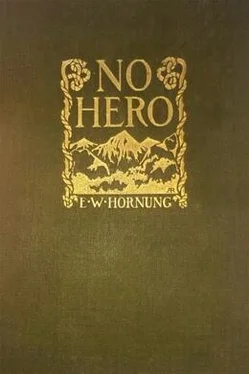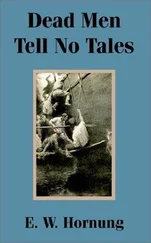E. Hornung - No Hero
Здесь есть возможность читать онлайн «E. Hornung - No Hero» весь текст электронной книги совершенно бесплатно (целиком полную версию без сокращений). В некоторых случаях можно слушать аудио, скачать через торрент в формате fb2 и присутствует краткое содержание. Год выпуска: 2017, Издательство: epubBooks Classics, Жанр: Классический детектив, на английском языке. Описание произведения, (предисловие) а так же отзывы посетителей доступны на портале библиотеки ЛибКат.
- Название:No Hero
- Автор:
- Издательство:epubBooks Classics
- Жанр:
- Год:2017
- ISBN:нет данных
- Рейтинг книги:5 / 5. Голосов: 1
-
Избранное:Добавить в избранное
- Отзывы:
-
Ваша оценка:
- 100
- 1
- 2
- 3
- 4
- 5
No Hero: краткое содержание, описание и аннотация
Предлагаем к чтению аннотацию, описание, краткое содержание или предисловие (зависит от того, что написал сам автор книги «No Hero»). Если вы не нашли необходимую информацию о книге — напишите в комментариях, мы постараемся отыскать её.
.’
No Hero — читать онлайн бесплатно полную книгу (весь текст) целиком
Ниже представлен текст книги, разбитый по страницам. Система сохранения места последней прочитанной страницы, позволяет с удобством читать онлайн бесплатно книгу «No Hero», без необходимости каждый раз заново искать на чём Вы остановились. Поставьте закладку, и сможете в любой момент перейти на страницу, на которой закончили чтение.
Интервал:
Закладка:
No Hero
E. W. Hornung
Chapter I
A Plenipotentiary
Has no writer ever dealt with the dramatic aspect of the unopened envelope? I cannot recall such a passage in any of my authors, and yet to my mind there is much matter for philosophy in what is always the expressionless shell of a boundless possibility. Your friend may run after you in the street, and you know at a glance whether his news is to be good, bad, or indifferent; but in his handwriting on the breakfast–table there is never a hint as to the nature of his communication. Whether he has sustained a loss or an addition to his family, whether he wants you to dine with him at the club or to lend him ten pounds, his handwriting at least will be the same, unless, indeed, he be offended, when he will generally indite your name with a studious precision and a distant grace quite foreign to his ordinary caligraphy.
These reflections, trite enough as I know, are nevertheless inevitable if one is to begin one's unheroic story in the modern manner, at the latest possible point. That is clearly the point at which a waiter brought me the fatal letter from Catherine Evers. Apart even from its immediate consequences, the letter had a prima facie interest, of no ordinary kind, as the first for years from a once constant correspondent. And so I sat studying the envelope with a curiosity too piquant not to be enjoyed. What in the world could so obsolete a friend find to say to one now? Six months earlier there had been a certain opportunity for an advance, which at that time could not possibly have been misconstrued; when they landed me, a few later, there was another and perhaps a better one. But this was the last summer of the late century, and already I was beginning to get about like a lamplighter on my two sticks. Now, young men about town, on two walking–sticks, in the year of grace 1900, meant only one thing. Quite a stimulating thing in the beginning, but even as I write, in this the next winter but one, a national irritation of which the name alone might prevent you from reading another word.
Catherine's handwriting, on the contrary, was still stimulating, if indeed I ever found it more so in the foolish past. It had not altered in the least. There was the same sweet pedantry of the Attic e , the same superiority to the most venial abbreviation, the same inconsistent forest of exclamatory notes, thick as poplars across the channel. The present plantation started after my own Christian name, to wit "Dear Duncan!!" Yet there was nothing Germanic in Catherine's ancestry; it was only her apologetic little way of addressing me as though nothing had ever happened, of asking whether she might. Her own old tact and charm were in that tentative burial of the past. In the first line she had all but won my entire forgiveness; but the very next interfered with the effect.
"You promised to do anything for me!"
I should be sorry to deny it, I am sure, for not to this day do I know what I did say on the occasion to which she evidently referred. But was it kind to break the silence of years with such a reference? Was it even quite decent in Catherine to ignore my existence until I could be of use to her, and then to ask the favour in her first breath? It was true, as she went on to remind me, that we were more or less connected after all, and at least conceivable that no one else could help her as I could, if I would. In any case, it was a certain satisfaction to hear that Catherine herself was of the last opinion. I read on. She was in a difficulty; but she did not say what the difficulty was. For one unworthy moment the thought of money entered my mind, to be ejected the next, as the Catherine of old came more and more into the mental focus. Pride was the last thing in which I had found her wanting, and her letter indicated no change in that respect.
"You may wonder," she wrote just at the end, "why I have never sent you a single word of inquiry, or sympathy, or congratulation!! Well—suppose it was 'bad blood'!! between us when you went away! Mind, I never meant it to be so, but suppose it was: could I treat the dear old you like that, and the Great New You like somebody else? You have your own fame to thank for my unkindness! I am only thankful they haven't given you the V.C.!! Then I should never have dared—not even now!!!"
I smoked a cigarette when I had read it all twice over, and as I crushed the fire out of the stump I felt I could as soon think of lighting it again as I should have expected Catherine Evers to set a fresh match to me. That, I was resolved, she should never do; nor was I quite coxcomb enough to suspect her of the desire for a moment. But a man who has once made a fool of himself, especially about a woman somewhat older than himself, does not soon get over the soreness; and mine returned with the very fascination which made itself felt even in the shortest little letter.
Catherine wrote from the old address in Elm Park Gardens, and she wanted me to call as early as I could, or to make any appointment I liked. I therefore telegraphed that I was coming at three o'clock that afternoon, and thus made for myself one of the longest mornings that I can remember spending in town. I was staying at the time at the Kensington Palace Hotel, to be out of the central racket of things, and yet more or less under the eye of the surgeon who still hoped to extract the last bullet in time. I can remember spending half the morning gazing aimlessly over the grand old trees, already prematurely bronzed, and the other half in limping in their shadow to the Round Pond, where a few little townridden boys were sailing their humble craft. It was near the middle of August, and for the first time I was thankful that an earlier migration had not been feasible in my case.
In spite of my telegram Mrs. Evers was not at home when I arrived, but she had left a message which more than explained matters. She was lunching out, but only in Brechin Place, and I was to wait in the study if I did not mind. I did not, and yet I did, for the room in which Catherine certainly read her books and wrote her letters was also the scene of that which I was beginning to find it rather hard work to forget as it was. Nor had it changed any more than her handwriting, or than the woman herself as I confidently expected to find her now. I have often thought that at about forty both sexes stand still to the eye, and I did not expect Catherine Evers, who could barely have reached that rubicon, to show much symptom of the later marches. To me, here in her den, the other year was just the other day. My time in India was little better than a dream to me, while as for angry shots at either end of Africa, it was never I who had been there to hear them. I must have come by my sticks in some less romantic fashion. Nothing could convince me that I had ever been many days or miles away from a room that I knew by heart, and found full as I left it of familiar trifles and poignant associations.
That was the shelf devoted to her poets; there was no addition that I could see. Over it hung the fine photograph of Watts's "Hope," an ironic emblem, and elsewhere one of that intolerably sad picture, his "Paolo and Francesca": how I remembered the wet Sunday when Catherine took me to see the original in Melbury Road! The old piano which was never touched, the one which had been in St. Helena with Napoleon's doctor, there it stood to an inch where it had stood of old, a sort of grand–stand for the photographs of Catherine's friends. I descried my own young effigy among the rest, in a frame which I recollected giving her at the time. Well, I looked all the idiot I must have been; and there was the very Persian rug that I had knelt on in my idiocy! I could afford to smile at myself to–day; yet now it all seemed yesterday, not even the day before, until of a sudden I caught sight of that other photograph in the place of honour on the mantelpiece. It was one by Hills and Sanders, of a tall youth in flannels, armed with a long–handled racket, and the sweet open countenance which Robin Evers had worn from his cradle upward. I should have known him anywhere and at any age. It was the same dear, honest face; but to think that this giant was little Bob! He had not gone to Eton when I saw him last; now I knew from the sporting papers that he was up at Cambridge; but it was left to his photograph to bring home the flight of time.
Читать дальшеИнтервал:
Закладка:
Похожие книги на «No Hero»
Представляем Вашему вниманию похожие книги на «No Hero» списком для выбора. Мы отобрали схожую по названию и смыслу литературу в надежде предоставить читателям больше вариантов отыскать новые, интересные, ещё непрочитанные произведения.
Обсуждение, отзывы о книге «No Hero» и просто собственные мнения читателей. Оставьте ваши комментарии, напишите, что Вы думаете о произведении, его смысле или главных героях. Укажите что конкретно понравилось, а что нет, и почему Вы так считаете.










